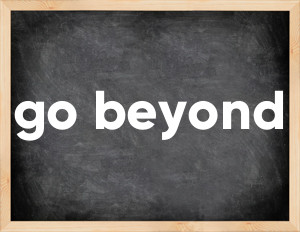 The English verb 'go beyond' is pronounced as [gəʊ bɪˈjɒnd].
The English verb 'go beyond' is pronounced as [gəʊ bɪˈjɒnd].
Related to:
phrasal verb.
3 forms of verb go beyond: Infinitive (go beyond), Past Simple - (gone beyond), Past Participle - (went beyond).
Here are the past tense forms of the verb go beyond
👉 Forms of verb go beyond in future and past simple and past participle.
❓ What is the past tense of go beyond.
Go beyond: Past, Present, and Participle Forms
| Base Form | Past Simple | Past Participle |
|---|---|---|
| go beyond [gəʊ bɪˈjɒnd] |
gone beyond [gɒn bɪˈjɒnd] |
went beyond [went bɪˈjɒnd] |
What are the 2nd and 3rd forms of the verb go beyond?
🎓 What are the past simple, future simple, present perfect, past perfect, and future perfect forms of the base form (infinitive) 'go beyond'?
Learn the three forms of the English verb 'go beyond'
- the first form (V1) is 'go beyond' used in present simple and future simple tenses.
- the second form (V2) is 'gone beyond' used in past simple tense.
- the third form (V3) is 'went beyond' used in present perfect and past perfect tenses.
What are the past tense and past participle of go beyond?
The past tense and past participle of go beyond are: go beyond in past simple is gone beyond, and past participle is went beyond.
What is the past tense of go beyond?
The past tense of the verb "go beyond" is "gone beyond", and the past participle is "went beyond".
Verb Tenses
Past simple — go beyond in past simple gone beyond
(V2).
Future simple — go beyond in future simple is go beyond (will + V1).
Present Perfect — go beyond in present perfect tense is
went beyond
(have/has + V3).
Past Perfect — go beyond in past perfect tense is
went beyond
(had + V3).
go beyond regular or irregular verb?
👉 Is 'go beyond' a regular or irregular verb? The verb 'go beyond' is .
Examples of Verb go beyond in Sentences
- It seems to have an impact which goes beyond simply eating less (Present Simple)
- I think this goes beyond the rattle (Present Simple)
- To go beyond the distance (Present Simple)
- Our reason will not go beyond the walls of that house (Future Simple)
- Nothing you say here goes beyond these walls (Present Simple)
- If you go beyond that door, we will know about it (Future Simple)
- You're asking me to go beyond the terms of our agreement (Present Continuous)
- It goes beyond that (Present Simple)